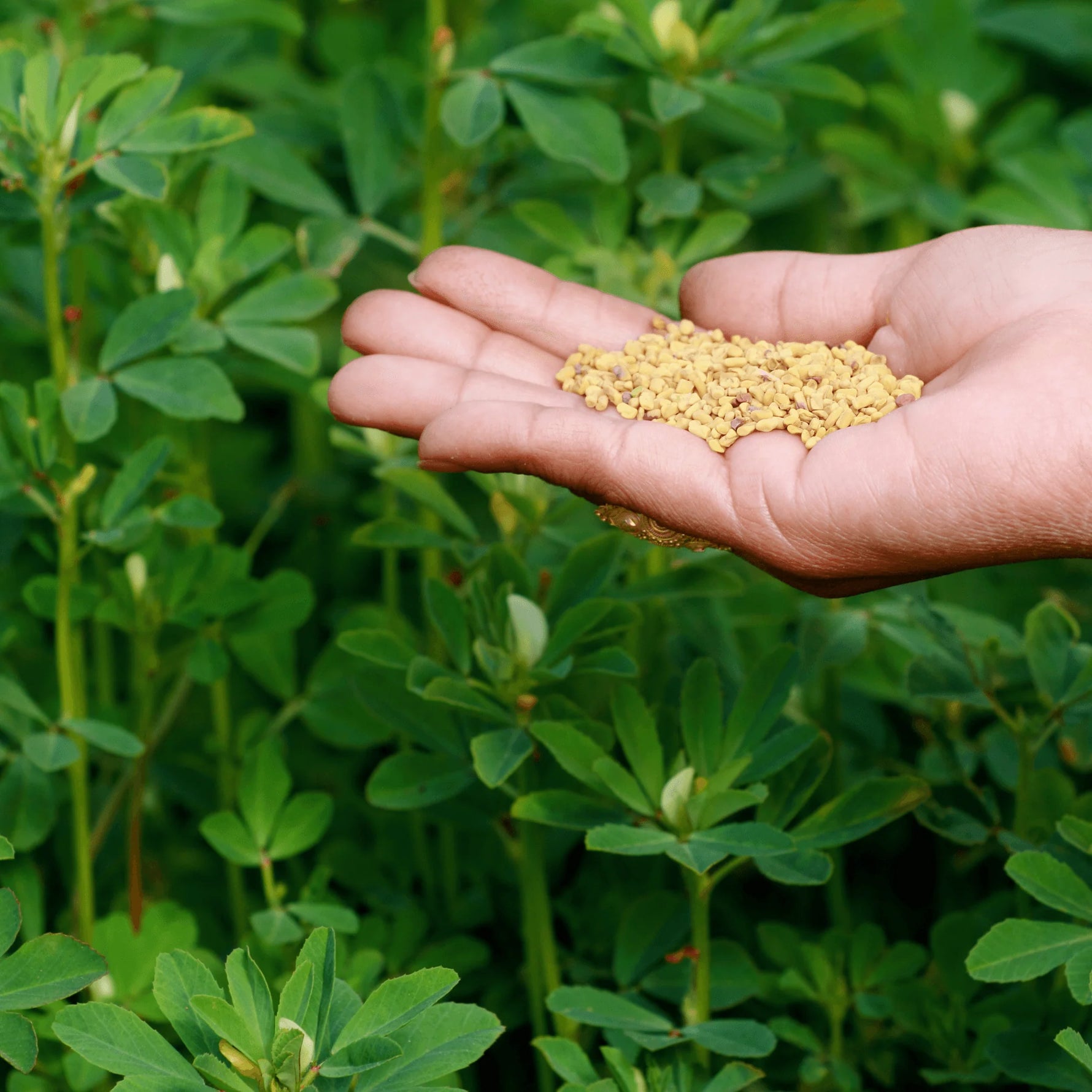
Dharaseeds
Fenugreek
Estimated delivery between April 15 and April 18.
Fenugreek (Trigonella foenum-graecum) is an ancient herb known for its distinct aroma and numerous health benefits. This versatile herb has been a staple in kitchens across the world, especially in Indian, Middle Eastern, and Mediterranean cuisines. Fenugreek seeds are used both as a spice and in medicinal preparations, known for their nutty, slightly bitter flavor. In addition to its culinary applications, fenugreek is prized for its potential health benefits, including supporting digestion and blood sugar regulation.
Key Benefits
- Distinct Flavor: Fenugreek seeds add a slightly bitter, earthy flavor to dishes, making them a popular ingredient in curries, spice blends, and teas.
- Health Benefits: Known for its potential to help with digestive issues, regulate blood sugar levels, and improve lactation in nursing mothers.
- Rich in Nutrients: High in protein, fiber, iron, and magnesium, fenugreek offers a variety of essential nutrients that support overall health.
- Culinary Versatility: Used in a wide range of cuisines, from Indian curries to Mediterranean dishes, and is an essential ingredient in spice mixes like curry powder and garam masala.
- Medicinal Uses: Fenugreek has been used for centuries in traditional medicine for its anti-inflammatory properties, as well as for treating conditions like indigestion, skin irritation, and respiratory issues.
Plant Features
- Plant Characteristics: Fenugreek grows as an upright, bushy plant with trifoliate leaves and small, white to yellow flowers. The seeds form in small pods that ripen in about 3 months.
- Size: Typically grows to 12–18 inches tall and spreads about 6–12 inches wide, forming a dense patch of foliage.
- Growth Habit: Fast-growing annual herb, producing an abundance of seeds once matured, which can be harvested for both culinary and medicinal use.
Planting Instructions
Planting Season
- Outdoor Planting: Plant fenugreek in early spring after the last frost date or in the fall for a winter harvest.
- Indoor Planting: Start seeds indoors about 4–6 weeks before the last frost date for an earlier start in the growing season.
Planting Details
- Planting Depth: Sow seeds 1/4 inch deep.
- Spacing: Space plants 6–8 inches apart in rows or clumps, allowing ample room for growth.
- Soil Requirements: Fenugreek prefers well-drained, fertile, loamy soil with a slightly alkaline pH of 6.0–7.0.
- Sunlight: Requires full sun to thrive but can tolerate light shade in hotter climates.
Care Instructions
- Watering: Keep the soil moist but not soggy. Water deeply once a week, especially during dry spells, to encourage strong root development.
- Fertilization: Fenugreek is a low-maintenance herb that benefits from light fertilization. Apply organic compost or a balanced fertilizer at planting time.
- Weeding: Keep the growing area free from weeds to ensure healthy growth and prevent competition for nutrients.
- Pest Control: Fenugreek is relatively pest-resistant but may attract aphids or other insects. Use organic insecticidal soap if necessary.
- Pruning: No major pruning is required, but removing older leaves can promote better air circulation around the plant.
Harvesting
- Timing: Fenugreek is typically ready to harvest in 3–4 months when the leaves begin to yellow and the seed pods dry out.
- Method: Harvest the plant by gently pulling it up or cutting it with pruning shears. Dry the pods thoroughly before extracting the seeds.
- Frequency: Fenugreek typically yields one crop per season, although multiple crops may be possible in mild climates.
Storage
- Short-Term: Fresh fenugreek leaves can be refrigerated for up to a week or frozen for later use.
- Long-Term: Fenugreek seeds should be stored in an airtight container in a cool, dry, dark place. Properly stored seeds can last up to one year.
Culinary Uses
- Spice Blends: Ground fenugreek is a key ingredient in many spice mixes, including curry powders and garam masala.
- Curries and Stews: Adds depth and a slightly bitter flavor to curries, stews, and soups.
- Teas: Fenugreek can be used to make herbal tea, known for its digestive and anti-inflammatory properties.
- Baked Goods: Fenugreek seeds are sometimes used in baking, adding a unique flavor to bread, crackers, and other baked goods.
Conclusion
Fenugreek is a highly versatile herb that serves both culinary and medicinal purposes. With its rich flavor and numerous health benefits, it is a must-have for any garden, especially for those who love to experiment with spices. Whether you’re adding it to your favorite curry, brewing a soothing herbal tea, or using it for its medicinal properties, fenugreek is a rewarding herb that enhances both your garden and your kitchen.







